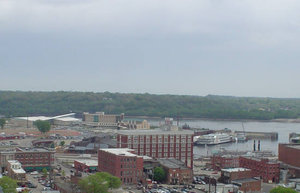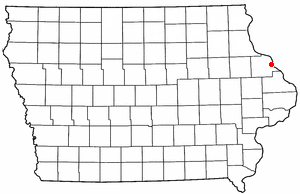Dubuque, Iowa
|
|
Dubuque is a city located in Dubuque County, Iowa. As of the 2000 census, the city had a total population of 57,686. It is the county seat of Dubuque CountyTemplate:GR.
Several ships of the US Navy have been named USS Dubuque after the city.
| Contents |
Government
The city of Dubuque uses the council-manager form of government. The mayor and the council members are all part time, with a full time city manager. The city is divided into five wards, with a person from each ward elected to the council. There are also two council members and a mayor that are at-large members of the council.
History
Main article: History of Dubuque, Iowa
Julien Dubuque was one of the first Europeans to settle in the Dubuque area. He mined lead at what would become called the Mines of Spain, which is about three miles south of the current city of Dubuque. The area would soon become the location of the first European settlement in what would become the state of Iowa. It would also become the headquarters of a Catholic Diocese named after the city in 1838. Since that time, the Catholic Church has been a major force in the history of the city. A large number of German and Irish immigrants helped contribute to the culture of Dubuque. Recently, the face of the city has changed as redevelopment efforts are made.
Culture and Institutions
Dubuque is home to four colleges. Loras College and Clarke College are both Catholic Colleges. The University of Dubuque associated with the Presbyterian Church. Emmaus Bible College is associated with the protestant Plymouth Brethren movement. Dubuque also houses two seminaries: the University of Dubuque Theological Seminary (Presbyterian) and Wartburg Theological Seminary (Lutheran-ELCA). Northeast Iowa Community College (NICC) has one of two main campuses approximately 20 minutes from Dubuque in Peosta, Iowa. NICC also has a satellite campus in downtown Dubuque.
Dubuque has several buildings on the National Register of Historic Places. The Fourth Street Elevator is located in downtown Dubuque. This elevator, which is the shortest and steepest railroad in existence, takes passengers up and down one of the large bluffs that dominate the city. Also, the Dubuque County Courthouse, with its Beaux Arts architecture, is also on the register. The Julien Dubuque Bridge is a National Historic Landmark, as is the Shot Tower, which was used to produce lead shot and is one the few such towers left in existence. Dubuque's Linwood Cemetery is noted for a number of famous people buried there, and the Dubuque Arboretum and Botanical Gardens have won a number of awards.
Dubuque's waterfront features the Ice Harbor, where the Diamond Jo Casino and William M. Black are based. Recently the National Mississippi River Museum & Aquarium, the Grand Harbor Hotel and Waterpark, and the Grand River Events Center have been built just north of the Ice Harbor. Land for this project was acquired from several businesses by condemning them through eminent domain. Most saw this action as unlawful and was pursued yet by the city council, most of which were real estates agents and/or had interest in overthrowing the current property owners so that they could invest in the common good of all.
The Dubuque Thunderbirds are a professional hockey team that play at the Five Flags Center.
About 25 miles west of the city is the town of Dyersville, Iowa. Dyersville is the home of the Basilica of St. Francis Xavier and the Field of Dreams.
The Dubuque Regional Airport is located about seven miles south of Dubuque along U.S. Highway 61. American Airlines provides service between Dubuque and O'Hare International Airport in Chicago, Illinois.
Political Climate
For most of its history, the people in Dubuque have been solidly Democratic. This was due to the large numbers of working-class people and Catholics living in the city. During the mid 19th century, anti-Catholic and anti-immigrant attitudes in the Republican party caused many in the city to oppose the Republican party. Nevertheless, some notable Republicans have come from the city, including House Speaker William Boyd Allison.
At times, Dubuque was called "The State of Dubuque" because of the fact that the political climate in Dubuque was very different than the rest of Iowa.
For the most part, Dubuque has maintained itself as a Democratic stronghold even in recent years, even as Republicans have made serious inroads into other areas of the country that have traditionally voted Democratic. Even so, the Republican presence is more visible and pronounced than in the past.
Geography
Dubuque is located at 42°30'16" North, 90°41'13" West (42.504321, -90.686865)Template:GR.
According to the United States Census Bureau, the city has a total area of 71.8 km² (27.7 mi²). 68.6 km² (26.5 mi²) of it is land and 3.2 km² (1.2 mi²) of it is water. The total area is 4.44% water.
Demographics
As of the censusTemplate:GR of 2000, there are 57,686 people, 22,560 households, and 14,303 families residing in the city. The population density is 841.1/km² (2,178.2/mi²). There are 23,819 housing units at an average density of 347.3/km² (899.4/mi²). The racial makeup of the city is 96.15% White, 1.21% Black or African American, 0.19% Native American, 0.68% Asian, 0.11% Pacific Islander, 0.69% from other races, and 0.96% from two or more races. 1.58% of the population are Hispanic or Latino of any race.
DubuqueIA.jpg
There are 22,560 households out of which 30.0% have children under the age of 18 living with them, 50.3% are married couples living together, 10.0% have a female householder with no husband present, and 36.6% are non-families. 31.0% of all households are made up of individuals and 12.6% have someone living alone who is 65 years of age or older. The average household size is 2.37 and the average family size is 2.99.
In the city the population is spread out with 23.6% under the age of 18, 11.8% from 18 to 24, 26.5% from 25 to 44, 21.6% from 45 to 64, and 16.5% who are 65 years of age or older. The median age is 37 years. For every 100 females there are 90.0 males. For every 100 females age 18 and over, there are 86.2 males.
The median income for a household in the city is $36,785, and the median income for a family is $46,564. Males have a median income of $31,543 versus $22,565 for females. The per capita income for the city is $19,616. 9.5% of the population and 5.5% of families are below the poverty line. Out of the total population, 9.3% of those under the age of 18 and 12.5% of those 65 and older are living below the poverty line.
Notable natives
- Kate Mulgrew, actress
- Jay Berwanger, first Heisman Trophy winner
External links
- Temple Beth El (http://urj.net/congs/ia/ia004/) - Union for Reform Judaism




